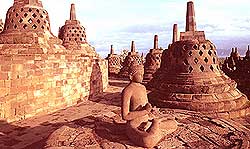World's largest Buddhist temple
by Dianne M. Villafuerte, Philippine Daily Inquirer News Service, May 20, 2005
Jogjakarta, Java (Indonesia) -- RUMORS reached the British lieutenant governor of Java about an ancient temple buried deep within the center of the island. Intrigued, he ordered a team of explorers to investigate. Weeks later, a magnificent, not to mention mysterious, historical shrine was unveiled.
 No, no, Lara Croft nor Indiana Jones would be nowhere in this story. The above account was what actually happened when the Borobudur Temple was rediscovered by Sir Thomas Stanford Raffles.
No, no, Lara Croft nor Indiana Jones would be nowhere in this story. The above account was what actually happened when the Borobudur Temple was rediscovered by Sir Thomas Stanford Raffles.
Impressive monument
In 1814, the British lieutenant governor of Java sent a survey team to verify reports of an impressive monument located at the center of the island of Java. For six weeks, a crew of 200 men labored to clear away the soil, volcanic ash and vegetation that buried the said sanctuary, unearthing what turned out to be one of the greatest archeological finds of the modern era.
The largest Buddhist temple in the world, the Borobudur Temple can be found near Yogyakarta, Central Java, Indonesia.
Built between 750 and 842 AD by Sanmaratungga, it measures 60,000 cubic meters with a height of 34.5 meters and a base measuring 123 meters by 123 meters. The shrine was constructed in three layers: a pyramidal base with five concentric square terraces, the trunk of a cone with three round platforms and a towering stupa or a bell-shaped chamber.
It has a total of 1,460 panels with each panel measuring 2 meters wide. The temple teems with relief sculptures, with 1,212 panels with narrative carvings. The Buddha statues total to 504, intact or otherwise, according to research.
Once the main site
The Borobudur was once the main site for Buddhist pilgrimage and for more than a century after it was completed it was the most significant Buddhist temple in the world. However, this changed when political and religious power moved away from the region after the end of the Mataram dynasty. Raffles brought the Borobudur back to the spotlight after centuries of neglect, launching a massive cleanup and restoration project.
One can just imagine how taxing it was to salvage the Borobudur. One account described how a large section of the temple was dismantled and rebuilt. Workers had to remove a million individual stone blocks, catalogue these on a computer, clean, then put these blocks back in the exact same order. How's that for restoration work?
The Borobudur Temple is one of the seven wonders of the world and the last restoration work was done from 1973 to 1983 with the help of Unesco.

 No, no, Lara Croft nor Indiana Jones would be nowhere in this story. The above account was what actually happened when the Borobudur Temple was rediscovered by Sir Thomas Stanford Raffles.
No, no, Lara Croft nor Indiana Jones would be nowhere in this story. The above account was what actually happened when the Borobudur Temple was rediscovered by Sir Thomas Stanford Raffles.